
[ad_1]
The name ‘Malappuram’ invokes a certain amount of curiosity among the average reader due to the minority-majority character of the district.
According to the 2011 Census, Muslims comprise 70.24 per cent of the population, Hindus comprise around 27.6 per cent and Christians 1.98 per cent.
The seat is located in northern Kerala and is part of the Malabar region. It has seven assembly segments — Malappuram, Manjeri, Mankada, Perinthalmanna, Vengara, Vallikunnu and Kondotty.
The constituency (including the time when it was called Manjeri) has consistently been won by the Indian Union Muslim League (IUML). The only exception was 2004 when the Communist Party of India (Marxist) or CPI (M) candidate T K Hamza won the seat.
While in the last few general elections and by-polls, the IUML has mostly maintained a vote share of more than 50 per cent, the CPI (M) has consistently polled over 30 per cent of the votes. It has however not been able to cross the 40 per cent mark.
For the Bharatiya Janata Party (BJP), the vote has ranged between 6 to 8 per cent.
The Social Democratic Party of India (SDPI), alleged to be linked to the now banned Popular Front of India (PFI), has twice reached close to 6 per cent.
This time around, the IUML, which has been contesting on two seats in the state as part of the seat sharing deal with the Congress-led United Democratic Front (UDF) alliance, has decided to swap its candidates. It has fielded E T Muhammed Bashir, who was the MP from neighbouring Ponnani. The CPI (M) has fielded V Vaseef, who is the state president of the Democratic Youth Federation of India.
Interestingly, the BJP, often accused of not giving tickets to Muslim candidates, has fielded Dr Abdul Salam in this seat where the large national minority is a majority.
Salam is not a conventional politician. He is an academic — a professor with expertise in the cashew crop, who was supported for the post of Vice Chancellor (VC) of the University of Calicut by those he is politically opposed to today, i.e. the IUML.
He worked with the Kerala Agricultural University and has served as visiting professor and consultant in a number of countries.
Swarajya‘s first meeting with Dr Salam was over breakfast. After a brief introduction to those accompanying him, including Sivaprasad P V, the district convenor of the party’s IT wing, V Sundaran, a BJP functionary, and Vinod V Nair, a friend of Dr Salam from Nagpur, we proceeded to a programme at the local Malayala Manorama office.
There, candidates from all three major parties were scheduled to speak about themselves and their vision for the constituency. While waiting for the programme to begin, myself and Sivaprasad began discussing Malappuram politics.
As I began by interaction with Dr Salam and his team, the first question that came to my mind was regarding the Citizenship Amendment Act (CAA) and the proposed uniform civil code (UCC) as the district had seen a lot of protests against these ideas earlier.
With the recent notification of the rules under the CAA, I was curious to know how much of a poll issue it would be in this constituency.
Answering my question, Sivaprasad said that it indeed was an important issue and that the Left Democratic Front (LDF) and UDF were using it as an emotional appeal to the minorities.
“See in vote share terms, around 93 per cent are in the anti-CAA side and 7 per cent are in the pro-CAA side, so it is easy for people to believe them.”
I then asked him what was Dr Salam and his party doing to counter the narrative of the opposition parties.
“To counter their narrative we have been explaining the history, people are reading and listening. Dr Salam says read the act and if there is anything against Indian Muslims, I am prepared to do anything you want. This is the Internet era, people cannot be cheated for too long.”
We then discussed the voting pattern of Hindus in the constituency.
“The Hindu vote is divided, it is not consolidated with any party. It is mostly on ideological basis. In the case of minorities, we can see the influence of religious institutions in deciding voting patterns,” he says.
Swarajya then asked him about the presence of the party in the constituency.
“We have booth committees in 400 out of 1,197 booths. The process of forming more committees in the rest of the booths is on. With elections coming, people are enthusiastic to join,” he said, adding, “As it is a minority dominated district, people used to hesitate to openly come out in support of the BJP. Now the trend is changing and even Muslims are coming out to support”.
Asked what had led to this change, he said, “It is the governance of Modi government. Schemes like Mudra Yojana have been received very well here as people are already entrepreneurial. Schemes such as PM Kisan and PM Awas have benefited a lot of people.”
“You go to any house, you’ll get at least 1 direct-benefit-transfer (DBT) beneficiary.”
After the programme at the Malayala Manorama office, during which I picked up a few points, my interaction with Dr Salam took a temporary pause as he had to leave for a medical checkup.
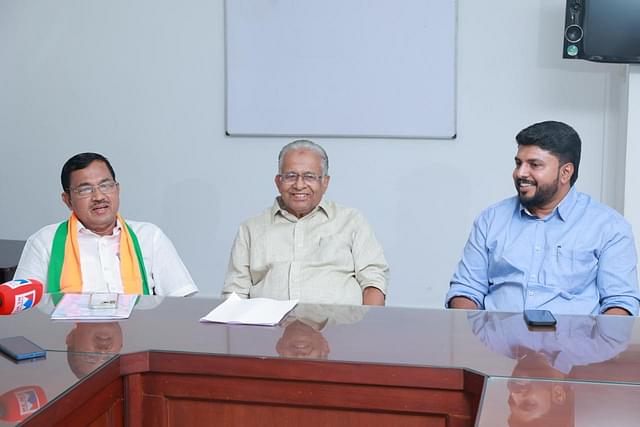
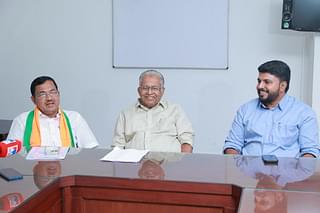
From left, Dr Salam, E T Muhammed Basheer and V Vaseef. (Special Arrangement)
Swarajya met Dr Salam again in the evening. It was during this meeting that we discussed his vision, plunge into politics, childhood etc, in depth. This was followed by dinner.
The conversation started with a discussion on his background.
“I come from an agricultural background. We had 10-12 acres of land but were a large family with nine children. We used to walk nine kilometres to school every day. While we had a good social standing, it was not an easy life.
“For plus two (classes XI and XII), I went to Kadakkal. After my MSc in agronomy, I worked in a bank for a few years. I did my PhD from Tamil Nadu Agricultural University. After my PhD, I joined as assistant professor in Kerala Agricultural University. For post-doctoral training, I went to University of Aberdeen in Scotland.
“During my academic career, I have written about 150 research papers and 13 books. I have also been a tropical farming consultant for over 20 countries. My focus area is cashew farming. I consider cashew as my fortune crop. It took me all over the world. Even my email address has the word ‘cashew’ in it.”
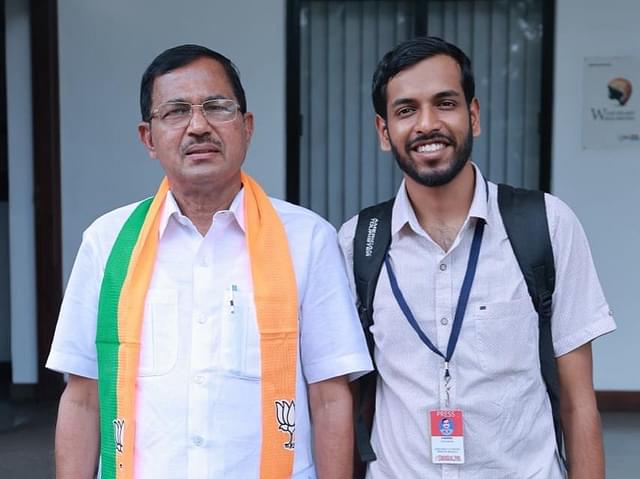
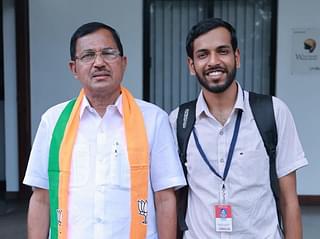
Rajesh with Dr Salam.
On the question of how he become the Vice Chancellor of University of Calicut, Dr Salman told Swarajya, “The IUML was looking to recommend names for the University of Calicut. Some of my friends took my CV. They felt it was good and I was nominated. I served as the VC from 2011-2015.”
The conversation then moved towards his plunge into politics.
“From 2008-09 onwards, I was watching the development done by Prime Minister Narendra Modi (then the chief minister) in Gujarat. I was especially impressed by the recovery after the 2001 Bhuj earthquake.
“I feel Modi ji is a hybrid of traditional Indian culture and most modern technology.
“I too tried my best to emulate him and work to make Calicut University as a clean, green and digital university.
“I had been wanting to join the BJP from 2014-15 onwards and contribute in the education field especially through the National Education Policy (NEP) but that happened only in 2019. After I joined, I was appointed as the national vice president of the Minority Morcha of the party.
“In the 2021 assembly elections, I contested from Tirur, (which is also in Malappuram).”
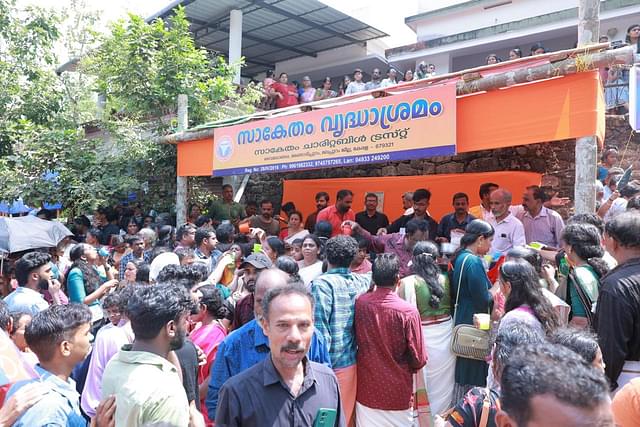
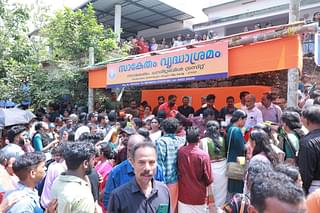
Seva Bharathi stall. (Special Arrangement)
Since the district predominantly consists of Muslims, who typically do not lean towards voting for the BJP like a large share of the Mulsim minority across the country, I inquired about the party’s strategies to secure victory in the constituency.
Malappuram is a tough seat for the BJP, Dr Salam said, adding, that the highest number of votes that the party had secured here was 82,000 in 2019.
“In 2021, it decreased to 69,000. This time we are targeting 2 lakh votes,” he said.
“But there has been change from before. The strong dislike for the BJP/RSS that was there earlier has reduced,” Dr Salam added.
“My observation is that over the last 10 years, Prime Minister Narendra Modi has got global acceptance. Admiration for him among Muslim women has increased due to the ban on triple talaq and the proposed UCC.”
In this context, I asked him about the UCC and what effect the BJP’s push for it would have in the constituency.
Answering my question, Dr Salam said that this was because under the Muslim personal laws, siblings of a father would get a share in the property if he has only daughters.
“A lot of Muslim couples are remarrying under the Special Marriage Act to ensure full inheritance for their daughters.”
“Like the remarriage done by advocate C Shukoor, which made headlines last year?” I ask.
“Yes, exactly.”
“To illustrate how things have changed, I’ll give you an example of a Muslim woman who I met in Vallikunnu. When asked why she supported Modi, she said that only Modi could have banned triple talaq and only he can deliver UCC. Her husband said that corruption had reduced after Modi had come to power and that had made him support him,” Dr Salam said, adding, “The Modi government’s schemes are catering to all sections of people.”
Asked what was keeping the Muslim community away from the mainstream, Dr Salam said, “Certain political parties are making them feel that they are ‘protected’ under them and that they are ‘secular’. They are exploiting the name of the religion for the sake of money.”
“Some organisations are known to use pictures of poor or disabled Muslims to make money for themselves, especially from the Gulf.”
“For the BJP, the nation is their religion. For them all those born and living in India are brothers and sisters. People have realised that Modi is not a ‘killer’ but a ‘carer’.”
“The amount of freedom Muslims get in India, they do not get anywhere else. You can’t say what you say in a Kerala mosque in the UAE.”
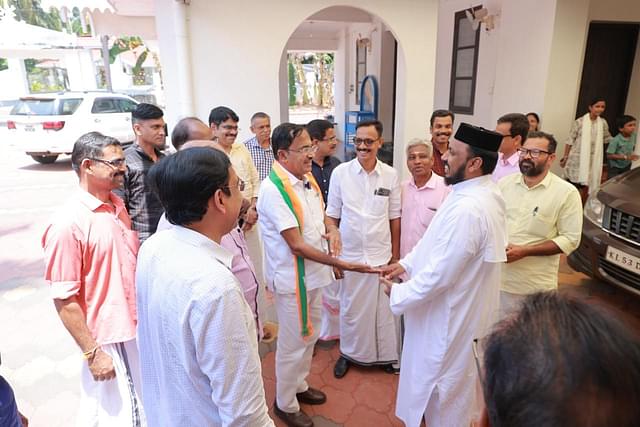
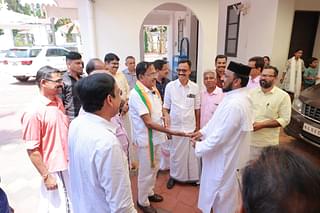
Dr Salam meeting Church leaders. (Special Arrangement)
I then brought up Anto Antony’s remark on Pulwama, in which he seemed to claim that Pakistan had no involvement in the Pulwama attack.
“It is not as if saying that Pakistan is not responsible will get them votes. It just shows that they can go to any extent to attack Modi ji,” says Sivaprasad. Dr Salam and others agree.
Bringing the conversation back to the issues related to this constituency, I asked Dr Salam to explain the vision he is taking to the people.
“I want to bring about integrated and sustainable development in the constituency. ‘Integrated’ means development of industries, human resources, water resources, etc, all together. By ‘sustainable’ I mean something that will stand the test of time and be environmentally friendly,” Dr Salam said.
“We are taking it to people as PM Modi’s special package for Malappuram. We want to change Malappuram from being known as a ‘minority district’ to a ‘model district’.”
“In the transportation sector, we intend to modernise the airport in Kozhikode to global standards and upgrade the Angadipuram railway station. (Malappuram town does not have a railway station. Angadipuram is one of the nearest stations),” he added.
“We would also take steps to revive the Chaliyar river and its tributaries. They are affected by encroachments and pollution.
“Malappuram can also be a destination for health and wellness. We have a very good environment with around 55 per cent forest cover (as per the state forest department’s 2021 report).
“Agriculture is an important activity here and so we would like to focus on value addition for crops like coconut, banana and cashew.
“Skill development is also something that I am passionate about. I would like to see more people joining the tech sector.
“For the Muslim community in particular, I think we need to focus on creating more opportunities for the Pasmanda Muslims and single moms, who have been left destitute or in penury due to being victims of triple talaq.”
“While I do not have numbers, they are sizeable in number.”
My conversation with Dr Salam on the first day ended with this discussion.
The next day, we started our tour of the constituency with a visit to the Thirumandhamkunnu temple at Angadipuram town in which Dr Salam was to inaugurate a buttermilk stall set up by Seva Bharathi, a Sangh Parivar organisation, for the temple festival.
While all of us joined the queue to enter the temple area, I lost track of others in the huge crowd and ended up going out of the area, quite far away from where the car was parked.
Back in the car, everyone had a hearty laugh at my expense. I was tired of the harrowing experience of being continuously pushed around by the crowd but smiled to myself remembering a couple of recent articles on Swarajya regarding the need for better temple experiences. Devotees deserve a better experience at our temples.
We then proceeded with the rest of the programme, which was to reach out to key voters.
Our first stop was at the St Mary’s Orthodox Syrian Church in Pathirikode, where Dr Salam had a brief meeting with Church leaders and community members.
Following that, we visited the house of Keezhatra Gopikrishnan, who is an NRI (non-resident Indian) and influential community leader. It was a meeting in which his family and some of his relatives participated.
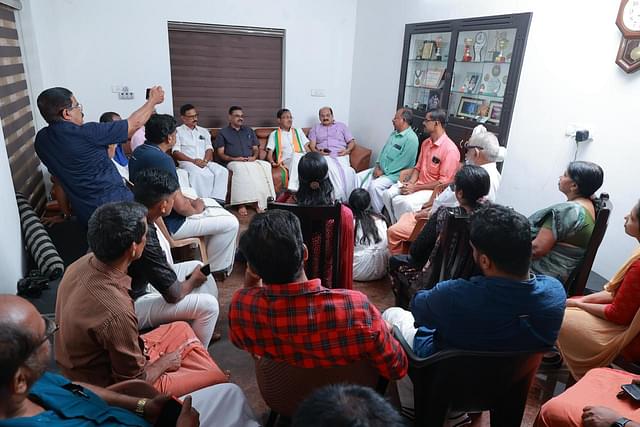
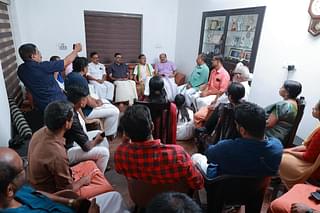
Meeting in the home of Gopikrishnan. (Special Arrangement)
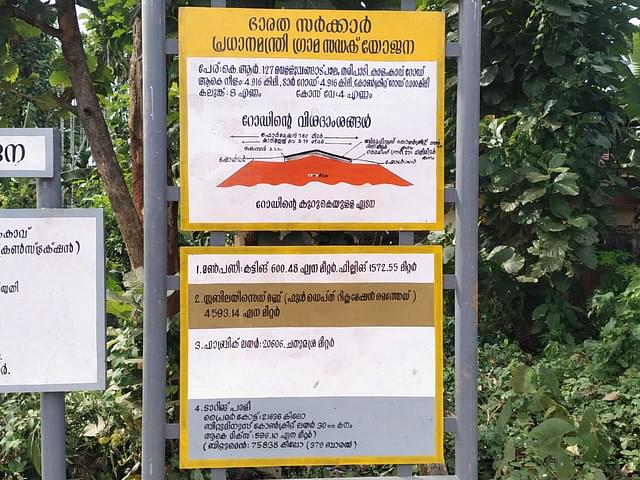
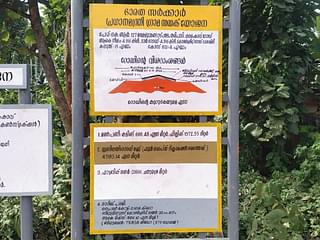
Boards showing roads made under PM Gram Sadak Yojana. (Liju)
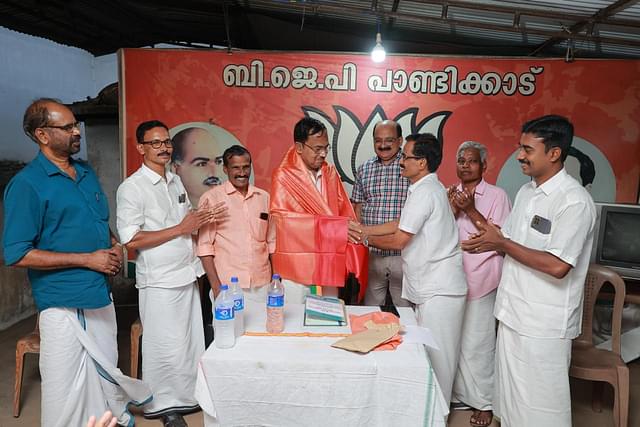
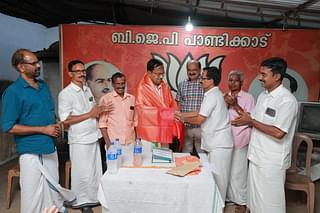
Dr Salam being welcomed at the Pandikkad office. (Special Arrangement)
There, I met advocate N Sreeprakash, who was one of the candidates fielded by the party previously from Malappuram. He had contested the 2014 elections and the 2017 by-elections.
“What do you think has changed from the time you contested?” I asked him.
“Earlier, the anti-BJP feeling was much stronger. In 2019, for example, UDF won maximum seats because there was a narrative here that Rahul Gandhi would become prime minister. That’s not the case anymore. We are in a much better situation in Malappuram as well as the rest of the state.”
We then had lunch at the home of Binesh Babu, who is the Malappuram cell coordinator of the party. I spoke with his family members to understand what they like about PM Modi. As they spoke only Malayalam, Sivaprasad helped in translation.
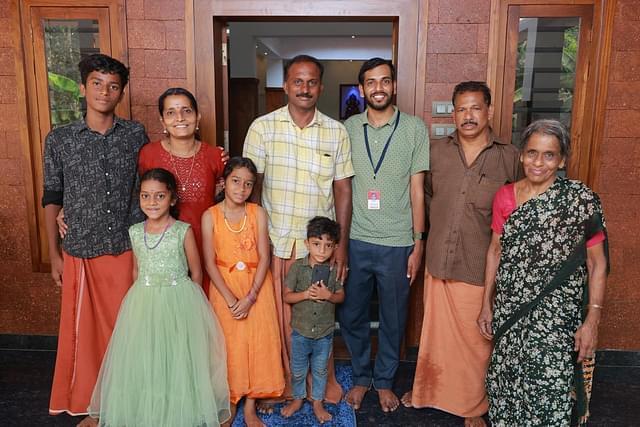
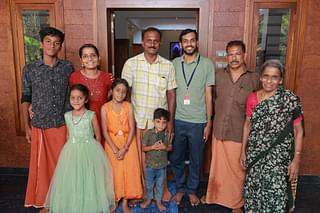
Rajesh with Babu and his family.
“What do you like about Modi?” I asked Babu’s wife Surya and his mother Bharathi.
While his wife said that she liked Modi because he is a good person and life had improved due to better road infrastructure, his mother said her liking for PM Modi was because he had done a lot of work for women and the poor.
Post lunch, I spoke with Dr Salam to learn more about his work in cashew nuts and what value addition could be done.
“Apart from the research papers I mentioned earlier, I also worked on developing newer varieties of cashew crop that would have higher yield and better taste. Two of the varieties we developed are known as Amrutha and Priyanka. We also developed a dwarf variety of cashew that would give us a good amount of nuts in 2-3 years, which is much earlier than what normal varieties would.
“By value addition, I mean we can produce a variety of processed cashew products like roasted, sweetened, salted etc. We can make small packets for plane passengers etc. Having a flourishing industry in Malappuram would be helpful for people here to get better prices and create employment. A lot of cashew is grown here.”
Dr Salam then left to take some rest after the meetings earlier in the day.
During this time, I spoke with Liju Korambaly, who lives in Pandikkad town, and is a member of the BJP’s SC Morcha, to get his perspectives.
Asked about the attitude of Muslims towards the BJP in Malappuram, he said that there has been a lot of change compared to before.
“Earlier, madrassas would boycott those Muslims who had connections with the BJP. Their children would not get admission. Now our mandal president is a Muslim. Things have come a long way.”
Continuing the conversation further, I asked him about radicalisation, a problem that Malappuram has been affected with.
“The ban on Popular Front of India (PFI) has helped a lot. There has been a crackdown on radicalism and extreme elements find it much more difficult to propagate their ideas. Social media has also helped in countering them.”
“What about the SDPI ? How is its presence? They have secured 5-6 per cent votes couple of times,” I ask.
“The SDPI is present but they do not receive much support from Muslims here. It is the IUML that receives maximum support from Muslims,” he said.
“What’s the BJP contesting on here?” I ask, given the IUML and the CPI(M) are the two largest parties here.
“Modi is the candidate here. We are approaching people with the central government’s delivery on schemes.
“You must have observed that this is a hilly area with undulating terrain but even then a good number of villages have proper roads. That is because of the work done under the Pradhan Mantri Gram Sadak Yojana.
“Earlier, work used to be done but boards were not put up leading people to believe that the state government has done it. They could get away by claiming that they did it. Now boards stating the name of the scheme have been put up so that people cannot be deceived.”
After that we left for a meeting at the house of the party’s district general secretary Rismil Nath. Speaking to me, Nath said that they needed a direct train to Coimbatore in Tamil Nadu.
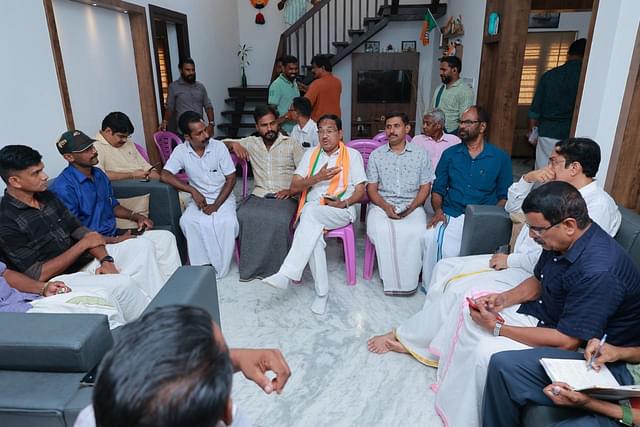
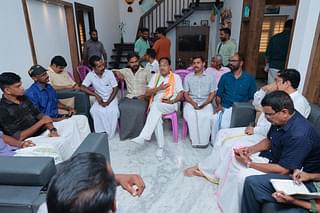
Meeting at the home of Rismil Nath. (Special Arrangement)
“It is important for both passengers and business. A lot of our supplies, i.e., textiles, pumps, wiring, plumbing material, etc, come from there.”
Further, we would like to bring a world class football stadium and central university in the district.
“Football runs in the blood here,” Nath says with a smile. Vinod concurs.
We then went to the house of a former BJP mandal president where Dr Salam addressed a gathering.
The message was clear, i.e., while reaching out to all sections, the party needed to boost its vote share, especially among the Hindus, by weaning them away from the CPI (M), which had traditionally been enjoying the bulk of their support, in the absence of the Congress.
Following this, we departed for a meeting at the area committee office in Pandikkad.
After the meeting, we had dinner at the residence of Sreeprakash.
Speaking with Sivaprasad on the way back to Malappuram, I asked how does the IUML see Dr Salam, now that he is with the BJP.
“They are politically opposed to us but there is no animosity. The IUML candidate was cordial, as you might have noticed during the programme.”
Continuing the conversation further, I ask if Dr Salam being from southern Kerala has affected how people perceive his candidature.
“I don’t think it is a factor. People here recognise him more as ‘Vice Chancellor sir’. He worked in Calicut, which is just 50 odd kilometres away.”
Our conversation then veered towards the challenges faced by the society in Malappuram.
“A lot of people from this district have migrated to the Gulf. In the last few years, many such migrants have returned due to issues like increasing preference for locals in jobs there or economic turmoil,” Sivaprasad said.
“As of now many of them have who have returned have set up businesses here and some have found alternative jobs but it would be difficult to rehabilitate them if the number of people returning becomes larger. It is specially difficult for older people,” he added.
With this our interaction came to an end and the next morning, I took leave of Dr Salam and his team to proceed to my next destination — Coimbatore.
This report is part of Swarajya‘s 50 Ground Stories Project – an attempt to throw light on themes and topics that are often overlooked or looked down. You can support this initiative by sponsoring as little as Rs 2,999/-. Click here for more details.
Save & read from anywhere!
Bookmark stories for easy access on any device or the Swarajya app.
[ad_2]